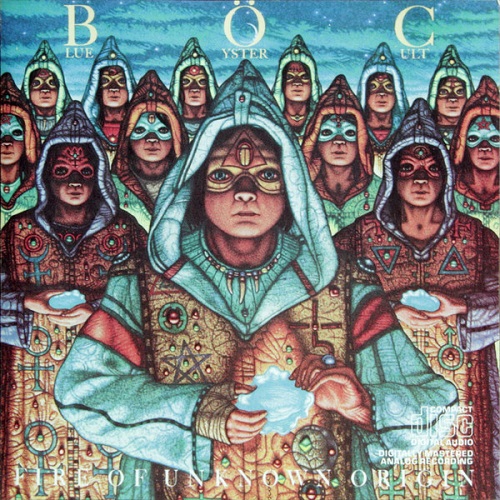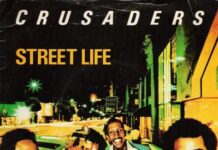It’s doesn’t matter that it’s been 50 years; Blue Öyster Cult remains one of rock music’s most underappreciated bands.
Here we have a powerhouse collective where democracy (at least for a time) was a driving force, given that all five members had a hand – and literal voice – in shaping songs and albums. The New York-based group would meld science fiction, monster madness, and tales of gallantry and heroism together to give bands like Black Sabbath and Deep Purple a true run for their money. Why the band’s first three albums — Blue Öyster Cult, Tyranny and Mutation, and Secret Treaties — didn’t make much of a dent on the charts is still mind boggling to me. Maybe people hear “She’s as beautiful as a foot” or “I’m a harvester of eyes” and they get turned off. I simply hear poetry.
Then, of course, comes Agents Of Fortune and its two standout features: the vocal presence of one Patti Smith and what would become a behemoth hit (and meme masterpiece), “(Don’t Fear) The Reaper.” Suddenly reaching platinum status, BÖC would leap from clubs to stadiums, bringing throngs of devoted fans on their feet (and on their knees). Yet as great as the climb may have been, there’s also an inevitable dip back down the commerciality slide with the band’s next three albums: Spectres, Mirrors, and Cultosaurus Erectus. It would be the fans that kept the band’s fire burning, as evidenced by the live album Some Enchanted Evening.
“We had those three subsequent albums — there was a lot of pressure from the record company. When we did Cultosaurus Erectus, we were trying to just tell them to fuck off basically,” original drummer Albert Bouchard told me recently. “We tried to find the most uncommercial songs that we could record because we needed to take a step back from that whole chasing the hit idea. And it worked — all of a sudden the fans were like, ‘Oh they finally made a real Blue Öyster Cult record,’ which was cool.”
“Our live shows never wavered a bit. We had a whole run of just selling out every night wherever we played, from Agents Of Fortune on,” Bouchard adds. “Even though Spectres didn’t sell as well, we had the lasers. We were playing huge stadiums. The fans never really gave up on us.”
With the dawn of the 1980s and the arrival of music television, suddenly the band saw its fan and commerciality fortunes intertwine again. In July 1981, BÖC released their eighth studio album, Fire Of Unknown Origin. Originating as tracks for the cult film Heavy Metal, the album would unveil to the world the band’s second (and last to date) Top 40 hit, go gold, and prove BÖC’s dynamism despite the fact it would mark the last work to feature the group’s original lineup.
Co-produced by Bouchard and Martin Birch, FOUO (now 40) is also one of the band’s best when taking into account its overall discography.

“I think that … one of the differences between that and all of the other records was that I was more involved in the production end of it,” Bouchard said. “I had always been involvement in the arrangements of the songs; of course, everybody was. We would all throw ideas in there, which was one of the strengths of the group. There was a lot of cooperation, especially on the first three albums and the last two albums.”
It would be the mellower track “Burnin’ For You” that led the charge. Following a somewhat similar compositional format to “Reaper” (which also features Donald “Buck Dharma” Roeser on lead vocals), the track would claim the top spot on Billboard’s Mainstream Rock chart. According to Bouchard, the song wasn’t crafted specifically for this album but was initially batted around during sessions for 1980’s Cultosaurus Erectus.
“We decided it wasn’t the right time to do it even though it was a great song,” Bouchard said. “So we put it off until the next one. We were not chasing the hit.”
The song began as lyrics in a letter from longtime band associate Richard Meltzer and was originally titled “Burn Out the Night,” Bouchard adds.
“He said, ‘Check out ‘Burn Out the Night’. I think this is the first thing that I’ve ever written that could be a hit.’,” he said. The iterative track would go through various forms, ultimately being shaped by the whole band to turn it into the hit we recognize today.
“It was like everybody had their hands on the console to mix it. It was a great experience. It came out great and it was a hit,” Bouchard said. “It took some time to get it done. I think it was about 10 hours to mix it.”
The accompanying video for the song would make the rounds on MTV. It would be the band’s second, following one for their songs, “The Marshall Plan.”
“We made this video and we thought, ‘Well, the video is not great but it’s decent.’ We made it rather quickly for under $10,000. It was very cheap,” Bouchard said. “So we decided that the one for “Burnin’ for You” needed to be better. We spent a lot more money on it. We went to LA; we had a union crew; we had extras; and we burned a car. We pulled all the stops for that one because we already knew it was going to be a hit so we had to have something that would endure.”
While BÖC were led to believe the album’s songs would make up the brunt of the Heavy Metal soundtrack, only one — “Veteran Of The Psychic Wars” — would make the final cut. It would turn out to be one of the band’s greatest – right up there with “Reaper,” “Astronomy,” and “The Red & The Black”/”I’m On The Lamb But I Ain’t No Sheep.” If you need proof, just watch live footage of the band playing the song, especially when Roeser’s mighty guitar solo starts wailing halfway through.
“It was the third song that we did with Michael Moorcock as a lyricist who I’ve gone on to work with a bunch of other albums and songs since then. [Singer/guitarist] Eric [Bloom] wrote it with his college bandmate John Trevors and we got it and kind of arranged it into the whole Marshall drum kind of beat,” Bouchard said. I think I was listening to Peter Gabriel’s third solo record and there was a song on it called ‘Intruder,’ which was the beginning of those gated drums that took over the 80s.”
While FOUO would boast synthesizers and sequencers as part of the group’s newfound sound, the group also takes time to go back to instrumental basics. “Heavy Metal: Black And Silver” is bare bones — Roeser on guitar, Bloom on bass, and Bouchard on drums.
“That’s all that was on that track. We were trying to sound like Led Zeppelin,” Bouchard said. “I think for some reason Joe [Bouchard] wasn’t there; he had an emergency at home, and he had to leave, so Eric said, ‘I’ll play it.’ And he did.”
Another album highlight is the oh-so subtle tribute to screen maven Joan Crawford. With Mommie Dearest well in the scope of public consciousness, thanks to Faye Dunaway’s over-the-top portrayal of the Academy Award-winning actress in the film of the same name, BÖC would record “Joan Crawford” on the album, featuring a sweeping, haunting piano opener.
“Really, it was a situation where I was having an argument with my wife at the time. The other guys – David Roter and Jack Rigg — we were recording at my house. I can’t remember why she was mad but she came in and yelled and I had to go and calm her down…Then I came back; we finished the song quickly because I’m like, guys we’re going to make a rough mix and that’s it,” Bouchard told me. “On the way back to New York City they were talking about it. I think David Roter said, ‘That’s like Joan Crawford had risen from the grave. That was really harsh.’ So Jack Rigg is like, ‘Hey, that’s a song.’ So they wrote most of the song on the way back to the city from my house. David called me up the next day and said, ‘Jack and I wrote this song called ‘Joan Crawford Has Risen From The Grave’’ and I was like, ‘Wow, OK, that’s cool. What’s it about?’”
When released, FOUO would go on to peak at Number 24 on the Billboard Top 200, the band’s highest ranking up to that point.
“I think (Columbia Records) was gratified. They said, ‘See it was good we stuck with these guys even though they put out a few records that were disappointing.’ And so the strength of that record helped me get my solo deal with them for Imaginos,” Bouchard said. “(BÖC) got to do another record which was Revolution by Night but that was disappointing. Then they put out Club Ninja and that was disappointing. And then Imaginos and that was disappointing. And then Buck Dharma put out Flat Out, his solo record, and that was disappointing. So yeah, we had a whole bunch in a row where there was no hits.”
When asked if Bouchard could foresee the inevitable fracturing of the band during the making of FOUO, he told me: “In retrospect, yes, there was a lot of tension. I think everybody had issues.”
BÖC continues to tour and release music to this day with Roeser and Bloom still front and center. Bouchard meanwhile was never one to rest on his laurels. After departing BÖC, he would work to transform Imaginos into a solo record with band producer, lyricist, and co-creator Sandy Perlman and a slew of other players well-known outside the BÖC sphere.
“When I left the group, I just pivoted right to, ‘OK well I’ll just do it as a solo record’ and Sandy Perlman was like, ‘Sounds great, maybe it’s meant to be. You can do this right now.’ And that’s what we did,” Bouchard said. “As far as recording that record, I mean I’m proud of it. I think it’s a great sounding record; it really holds up. It doesn’t really sound that dated; maybe slightly but not like a lot of the other records of that time.
Per a prior VintageRock.com piece, Imaginos has since been brought into the 21st century with a new version called Re Imaginos, released during the recent pandemic. Following through on a promise Bouchard made to Perlman shortly before the latter’s death in 2016, he released the album “the way that you wanted it to be put out.”
Though it’s been four decades since Bouchard has left the band, he adds that relationships with the other BÖC members are currently “as good as it ever was.”
“There was a period where I was pretty upset about the whole being asked to leave. And then there was a whole other period where we were trying to get back to a normal relationship and there was still too much baggage. That all basically disappeared in 2016 — it was the 40th anniversary of Agents Of Fortune and they took me on the road with them,” he said. “That was nice because we got to spend extended periods of time together, riding in the car, reminiscing and telling jokes, and remembering the funny things we did. That was cool.”
He adds: “It’s been a process, but at this point in time it’s great.”
 ***
***
Share your feedback and suggestions for future columns with Ira at vinylconfessions84@gmail.com. Ira’s new book, “Hello, Honey, It’s Me”: The Story of Harry Chapin, is available for purchase here.




















